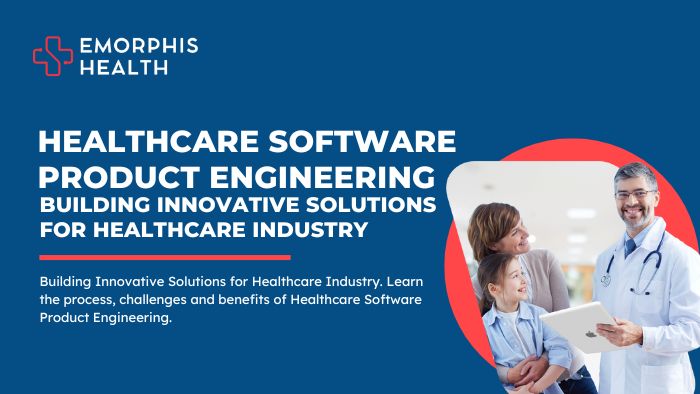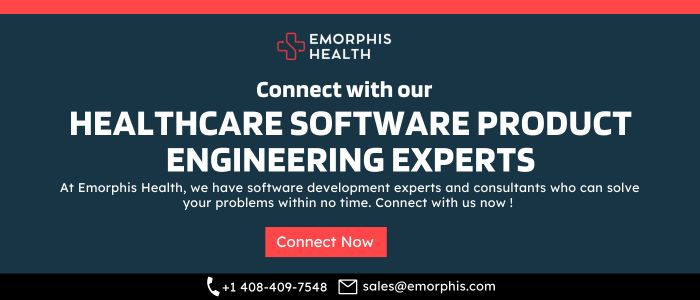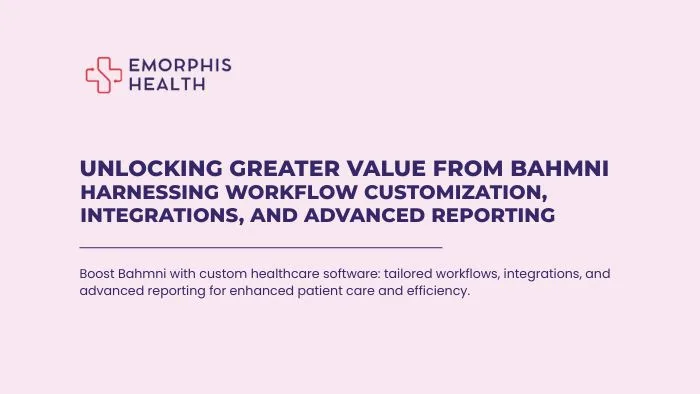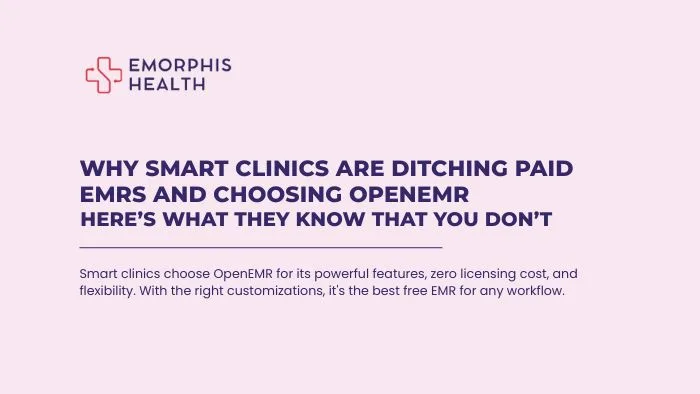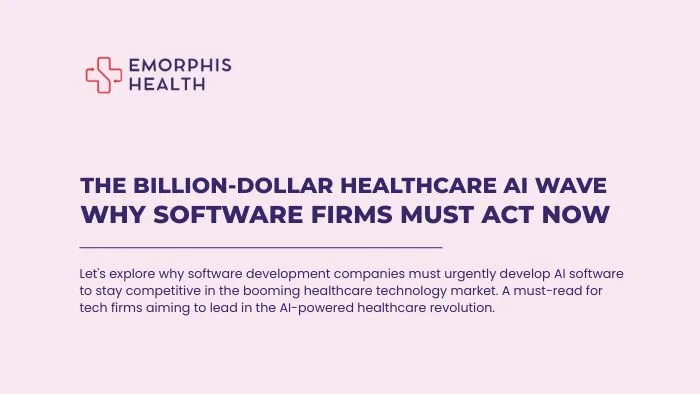Introduction
See Contents
- 1 Introduction
- 2 What is Healthcare Software Product Engineering?
- 3 Importance of Healthcare Software Product Engineering
- 4 Healthcare Software Product Engineering Lifecycle
- 5 Challenges in Healthcare Software Product Engineering
- 6 Benefits of Partnering with a Healthcare Software Product Engineering Company
- 7 Conclusion
The healthcare industry is undergoing a digital transformation with the advent of healthcare software products. Healthcare software development is enabling medical professionals to improve patient outcomes, reduce costs, and streamline workflows. It is also empowering patients to take control of their health, facilitating access to medical information, and enhancing communication with their healthcare providers.
According to a report from Grand View Research, the global healthcare IT market size is expected to reach US $373 billion by 2027, growing at a CAGR of 12.5% from 2020 to 2027. According to a recent report by Fortune Business Insights, the global healthcare analytics market size is expected to reach US $80.47 billion by 2027, growing at a CAGR of 28.9% from 2020 to 2027. Also, the adoption of cloud-based healthcare software solutions is on the rise. In a survey, 90% of healthcare organizations said they were using cloud-based software or planning to do so in the next 12 months. The use of artificial intelligence (AI) in healthcare is increasing. In a recent report, the global AI in healthcare market size is expected to reach $45.2 billion by 2026, growing at a CAGR of 44.9% from 2019 to 2026.
Now, let’s check about healthcare software product engineering and its importance in the healthcare industry.
What is Healthcare Software Product Engineering?
Healthcare software product engineering is the process of designing, developing, and also deploying software products that cater to the needs of the healthcare industry. In fact, the software products developed can range from patient engagement tools, clinical decision support systems, electronic health records, and medical billing systems, to telemedicine platforms and wearables. As a matter of fact, healthcare software product development aims to address the challenges of the healthcare industry by improving healthcare outcomes, reducing costs, and enhancing patient experiences.
Importance of Healthcare Software Product Engineering
Healthcare software product engineering has revolutionized the way healthcare is delivered. It has enabled healthcare professionals to make informed decisions, improve patient care, and also optimize workflows. Some of the benefits of healthcare software product engineering are:
A. Improved patient outcomes
Software Development has enabled healthcare professionals to access patient data in real-time, making it easier to make informed decisions. Both patient outcomes and healthcare expenses have improved as a result of this.
B. Enhanced patient experience
Healthcare software product engineering has enabled patients to take control of their health by providing them access to their medical records, facilitating communication with healthcare providers, and allowing them to schedule appointments online.
C. Streamlined workflows
Software solutions have optimized healthcare workflows by automating manual tasks, reducing paperwork, and also improving communication between healthcare professionals.
D. Reduced medical errors
The healthcare software product has significantly reduced medical errors by improving the accuracy of diagnoses, reducing medication errors, and ensuring that patient data is up-to-date and accessible to healthcare professionals.
E. Improved data analysis
Software solutions and app development have enabled healthcare organizations to collect and analyze large amounts of patient data, allowing them to identify trends, predict outcomes, and also make data-driven decisions.
F. Increased efficiency
Healthcare product engineering has increased the efficiency of healthcare organizations by reducing administrative tasks, optimizing resource allocation, and in fact, improving communication between healthcare professionals.
G. Cost savings
It has the potential to save healthcare organizations significant amounts of money by reducing the length of hospital stays, minimizing the need for readmissions, and reducing the cost of medical errors.
Overall, healthcare software development and engineering is an essential tool for healthcare organizations that want to improve patient outcomes, enhance patient experiences, optimize workflows, reduce medical errors, and save costs. By investing in healthcare software development, healthcare organizations can stay ahead of the curve and provide the highest quality of care to their patients. According to a recent report by Meticulous Research, the global healthcare IT outsourcing market size is expected to reach US $61.28 billion by 2027, growing at a CAGR of 10.3% from 2020 to 2027.
Now let’s check the process of healthcare software product engineering which you can while you look for healthcare IT outsourcing.
Healthcare Software Product Engineering Lifecycle
The healthcare software product engineering lifecycle involves the following stages:
1. Planning
In the planning stage, the healthcare software development team identifies the problem to be solved and develops a roadmap for the software product. This stage sets the foundation for the entire process, and it’s essential to have a clear understanding of the problem to ensure that the software product addresses the needs of all stakeholders, including healthcare professionals, patients, and also regulatory bodies. The team needs to consider the software product’s purpose, target audience, features, and benefits.
2. Requirements gathering
In the requirements gathering stage, in fact, the team gathers requirements from all stakeholders, including healthcare professionals, patients, and regulatory bodies. This stage is critical to ensure that the software product meets the needs of all stakeholders and complies with all regulatory requirements. The team must conduct interviews, surveys, and also workshops to identify the stakeholders’ needs and develop a comprehensive list of requirements.
3. Design
In the design stage, the team develops a detailed design for the software product, including the user interface, data architecture, and also software architecture. This stage is crucial to ensure that the software product meets the stakeholders’ needs and provides an intuitive and user-friendly experience. The team must consider the software product’s scalability, flexibility, maintainability, also, data security and privacy requirements.
4. Development
In the development stage, the team builds the software product, including coding, testing, and debugging. This stage is critical to ensure that the software product functions correctly and also meets the stakeholders’ needs. The team must follow the best coding practices, use robust testing methodologies, and ensure that the software product is bug-free and secure.
5. Deployment
In the deployment stage, the team deploys the software product in the production environment. This stage is critical to ensure that the software product is available to the stakeholders and meets the performance and availability requirements. The team must follow the best deployment practices, use efficient deployment tools, and also ensure that the software product is accessible to all stakeholders.
6. Maintenance
In the maintenance stage, the team provides ongoing support and maintenance to the software product, including bug fixes and feature enhancements. In fact, this stage is crucial to ensure that the software product meets the stakeholders’ needs and complies with the changing regulatory requirements. The team must provide timely support, fix bugs promptly, and also incorporate stakeholders’ feedback to improve the software product’s functionality and usability.
While healthcare software product engineering offers numerous benefits, it is not without challenges. The following section will discuss some of the common challenges healthcare organizations face in the healthcare software development process and how to mitigate them.
Challenges in Healthcare Software Product Engineering
Software product engineering is a complex process that involves several challenges. Some of the challenges in healthcare software product engineering are:
- Regulatory compliance: Healthcare software products must comply with several regulatory bodies, including HIPAA, and GDPR regulations. These regulations can be time- and money-consuming to comply with.
- Data security: Healthcare software products must ensure the security of patient data. This involves implementing data encryption, access controls, and other security measures to prevent unauthorized access to patient data.
- Interoperability: Healthcare software products must be able to communicate with other systems and devices in the healthcare ecosystem. This requires adherence to industry standards and protocols.
- Usability: Healthcare software products must be designed with usability in mind. This involves developing intuitive user interfaces and workflows that are easy for healthcare professionals and patients.
- Integration with legacy systems: Healthcare organizations often have legacy systems that are still in use. Healthcare software products must be able to integrate with these systems to ensure a smooth transition and minimize disruption.
- Cost: Healthcare software development can be expensive, requiring significant investment in development, testing, and deployment. Healthcare organizations must carefully consider the return on investment when investing in healthcare software products.
As healthcare organizations navigate the challenges in healthcare software product engineering, partnering with an experienced and reliable healthcare software development company can provide numerous benefits. The following section will discuss how a healthcare software development partner can help organizations develop secure, compliant, and innovative software products that improve patient outcomes and optimize healthcare workflows.
Benefits of Partnering with a Healthcare Software Product Engineering Company
Partnering with a healthcare software product engineering services company can provide numerous benefits for healthcare organizations. Such companies specialize in developing secure, compliant, and innovative software products that meet the stakeholders’ needs and comply with regulatory requirements.
One of the key benefits of partnering with a healthcare software product engineering company is access to a team of experienced and skilled software engineers, project managers, and quality assurance professionals. These professionals have expertise in various areas, including software development, user experience design, data architecture, and regulatory compliance. They can work closely with healthcare organizations to understand their unique needs and develop software products that meet their specific requirements.
Another benefit of partnering with a healthcare software product engineering company is access to the latest technologies and best practices. These companies invest in the latest technologies and tools to develop software products that are secure, scalable, and reliable. They also follow industry-standard best practices and methodologies, such as Agile and DevOps, to ensure that the software products are developed efficiently and meet quality standards.
Furthermore, partnering with a healthcare software product engineering company can help healthcare organizations reduce costs and accelerate time-to-market. These companies can leverage their experience, expertise, and tools to develop software products quickly and efficiently, reducing development time and cost. They can also help healthcare organizations identify areas for optimization and improvement, such as automating manual tasks and streamlining workflows, to further reduce costs and improve the overall efficiency of the healthcare organization.
Conclusion
Healthcare product engineering has the potential to transform the healthcare industry by improving patient outcomes, reducing costs, and enhancing patient experiences. However, it is a complex process that involves several challenges, including regulatory compliance, data security, interoperability, usability, integration with legacy systems, and cost. Healthcare organizations must carefully evaluate their needs and consider these challenges when investing in healthcare software products. Partnering with a healthcare software product engineering company can help organizations develop secure, compliant, and also innovative software products that improve patient outcomes, enhance the patient experience, and optimize healthcare workflows. As a matter of fact, with careful planning and execution, healthcare software product engineering can deliver innovative solutions that meet the needs of healthcare organizations and patients alike.

